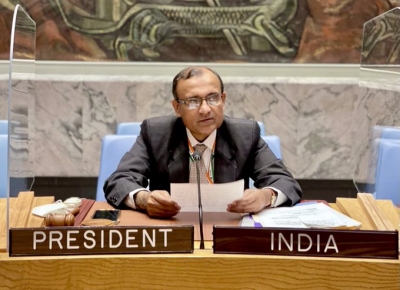By Arul Louis
United Nations– Warning that terrorism continues to threaten Afghanistan, India has demanded the Taliban to keep its commitment to not allow the country to be used by terrorists.
Citing last month’s “deplorable” attack on the Kabul Airport that killed 13 American soldiers and more than 170 Afghans, India’s Permanent Representative T.S. Tirumurti said on Thursday that “terrorism continues to pose a serious threat to Afghanistan”.
He said that the resolution adopted last month when India presided over the Council “noted the commitment of the Taliban not to allow the use of the Afghan soil for terrorism, including from terrorists and terrorist groups designated” by the UN.
The resolution took into account the “collective concerns” on terrorism and “underlined that Afghan territory should not be used to threaten or attack any country or to shelter or train terrorists, or to plan or to finance terrorist acts”, he said at the Council meeting on Afghanistan.
“It is therefore important that commitments made in this regard (by the Taliban) are respected and adhered to.”
Tirumurti said that he hoped that the Taliban will also respect its commitment to allow Afghans to travel abroad and ensure secure departure for them and all foreign nationals.
Secretary-General Antonio Guterres’s Special Representative for Afghanistan, Deborah Lyons, raised the issue of Taliban’s leadership being on the UN’s list of terrorists.
Of the 33 members of the interim government announced by the Taliban, many are on the UN sanctions list, including Prime Minister Mullah Mohammad Hassan Akhund, the two deputy prime ministers, and Foreign Minister Amir Khan Muttaqi, she said.
“All of you will need to decide which steps to take regarding the sanctions list, and the impact on future engagement,” she told the Council.
Lyons added that the protest around the country “show that the Taliban have won power, but not yet the confidence of all Afghan people”.
Afghanistan’s Permanent Representative Ghulam Isaczi, who has defied the Taliban regime, said that the Security Council should reevaluate exempting the insurgent leaders from UN sanctions since they have failed to resolve the conflicts through peaceful means.
“The Council must use all its diplomatic tools, including the full implementation of existing multilateral sanctions to ensure that the Taliban is sincere and genuine in finding a comprehensive settlement,” he said.
He urged all countries to withhold recognition of any government in Afghanistan “unless it’s truly and formed on the basis of free will”.
“I further urge you to draw a red line, regarding Taliban treatment of women and girls, and respect for the rights of all.”
He said that the protests in his country, which the Taliban is brutally suppressing, are a sign that that the people will not accept a totalitarian system imposed upon them and will demand their freedom.
Isaczi added that the Taliban was committing atrocities, and possible war crimes, in the Panjshir Valley with the support of foreign terrorist fighters and foreign intelligence and military.
Malala Yousafzai, who was attacked by extremists in Pakistan for advocating girls’ education, reminded the Security Council of its commitment to protect the rights and dignity of women and girls.
“We must support education for Afghan girls, because it is a human right and because it is vital to a peaceful and stable Afghanistan.
“So today I’m here to call on the Security Council to protect Afghan girls and women,” and “send a clear and unequivocal message to the Taliban” that a fundamental condition for a working relationship is giving girls their right to education, she added.
Tirumurti appealed to the international community “to come together, rising above any partisan interests, to stand together with the people of Afghanistan in their desire for peace, stability and security in the country”.
“We reiterate the need for the voices of Afghan women to be heard, aspirations of Afghan children to be realised and the rights of minorities to be protected. We call on humanitarian assistance to be provided urgently and underline the need to provide unhindered access to the UN and other agencies in this regard.”
He said that India has contributed significantly to the development of Afghanistan through more than 500 development projects in each of the 34 provinces of the country in critical areas of power, water supply, road connectivity, healthcare, education, agriculture and capacity building.
India also sent 75,000 metric tonnes of wheat last year to Afghanistan as humanitarian aid, he said.
“We hope that these developments projects and the education and human resource development imparted by India over the years will help in contributing to the development of an inclusive and progressive polity.” (IANS)















